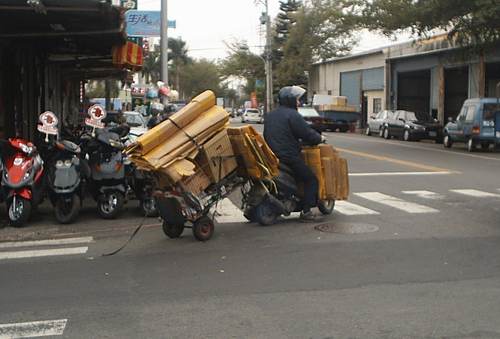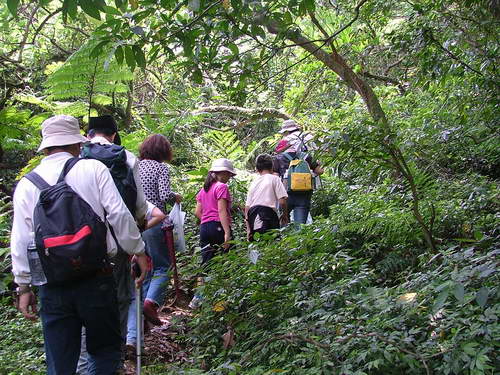Michael A. Turton
 Taking
trash to a recycler. Thousands of people pick up recyclables off the
street
or collect them from local factories, and make a little money
taking
them to recycling companies.
Taking
trash to a recycler. Thousands of people pick up recyclables off the
street
or collect them from local factories, and make a little money
taking
them to recycling companies.|
Michael A. Turton |
 Taking
trash to a recycler. Thousands of people pick up recyclables off the
street
or collect them from local factories, and make a little money
taking
them to recycling companies. Taking
trash to a recycler. Thousands of people pick up recyclables off the
street
or collect them from local factories, and make a little money
taking
them to recycling companies. |
|
Learning Chinese |
|
|
|
|
|
|
| The explosion of Taiwanese language since the end of martial law has revolutionized the language situation here. Now many mainlanders have learned Taiwanese and some businesses will not hire locals who cannot speak fluent Taiwanese. Taiwanese is common on the streets, especially outside of Taipei. The new education reforms have mandated the teaching of local languages in the schools as well. |
| Further, new government language policies are encouraging the use of Hakka and other minority languages. The long-term result will probably be the balkanization of the island, but in the short-term now is a very exciting time linguistically and culturally on Taiwan. |
| Outside of northern Taiwan people largely speak Taiwanese with each other, not Mandarin. Central and southern Taiwan are hotbeds of Taiwanese nationalism, whereas the north is about one-third mainlander. You will probably learn Mandarin more rapidly in the north. |
| The major foreign languages are Japanese and English. Most everyone speaks three or four languages now, some combination of Taiwanese, Chinese, Japanese, English and Hakka. Spanish and French are probably the other significant languages, but they are far, far behind the others. |
| If you speak a Western language besides English, you can probably make money tutoring in that as well. If you are a native speaker of an in-demand European language, and you have a masters degree, you might be able to obtain a university position teaching that language. |
|
|
|
|
|
|
| This is because there are two basic modes of
interaction,
one for outsiders and one for insiders. If you don't speak
Chinese,
people will place you in your proper role of foreigner and
treat
you with respect and deference.
|
|
| If you speak Chinese,
however, you will often elicit the
casual brusqueness
with which most Chinese treat each other (and regard as normal).
Westerners often experience this as rude. |
 Hikers make their way up a ridge on the east coast. |
| Another problem with speaking excellent Chinese is that you will be exposed to all sorts of interactions you might otherwise have avoided. If you have an accident and can't speak Chinese, nobody can accuse you of anything. You might be made to do extra work at your office if people know you can translate. If you can speak Chinese, you might be horrified to learn that the fishing trip your kind friend took you on was actually to a protected nature reserve. And so forth. |
| However, there are numerous drawbacks to not knowing Chinese. For one thing, it is insulting to live somewhere without speaking a local language (Both foreigners and Taiwanese often express contempt for foreigners who live in Taiwan without speaking the language), and for another, those foreigners generally know very little about Taiwan. If you really want to participate in the life of the island, Chinese is more or less mandatory. |
| Learning Chinese is endlessly useful in everyday life, for everything from deciphering food packaging labels to reading street signs. Many people find it extremely difficult to get around in Taiwan's cities without some Chinese, especially outside of Taipei where the signage is less likely to feature English. |
| Most importantly, Chinese is the ticket to any
number of
high-paying teaching and translation jobs.
|
|
| Best of all, you can read Tang poetry in the original. |  A street devoted to furniture stores in Taipei. |
|
|
|
|
|
|
| The tones will cause problems for the first few months. Most foreigners go through a difficult phase after they know some Chinese, in which they think they are speaking Chinese, but actually, because their tones are unclear, they are speaking gibberish which the locals literally cannot understand. Frustrating, but this phase will pass. Just bull through it and keep reminding yourself that it is your problem, and not the locals. |
| You will know that your Chinese tones have arrived when you hear another foreigner speaking during this phase of her learning, and you discover that you can't understand a word they are saying. |
| The hard part is the characters. I suggest you
purchase
a copy of McNaughton's Reading and Writing Chinese, and learn
fifteen
characters to twenty-five characters a day, writing them over and over,
until you've memorized the book, then move on to more difficult
books.
|
|
A concert on a college campus. |
Only about three thousand characters need be committed to memory to read a newspaper. The real key to learning is commitment to the drudgery of memorizing all these characters. |
|
|
|
|
|
|
| If you aren't willing to speak and sound stupid,
you will
never get anywhere (many Taiwanese are unwilling to sound stupid and
lose
face, thus they have difficulty learning English).
Language exchanges are common and a good way to make friends and meet members of the opposite sex. |
| Taiwanese is rather a more difficult case. The island sports a number of local accents and good self-teaching materials are hard to come by. But many foreigners learn it and find it quite easy. A boy/girlfriend will come in handy here as well. Locals really appreciate it when foreigners take the trouble to learn Taiwanese. |
|
|
|
|
|
|
| You may actually find it difficult to practice Chinese, since many will use you as an opportunity to practice English. Your experience of Taiwan will change radically if you speak Chinese and you may come to understand Taiwan and its culture in a way that will disappoint you. People may assume you know more than you actually do if you speak Chinese. All of these things will have to be weighed when communicating on Taiwan. |
| In many official circumstances I do not speak Chinese, but let my wife handle the affair, standing behind with a big dumb smile, the stupid foreigner who has to be helped (conversely, when my Taiwanese wife needs something, she often drags me along, because she gets better service if I, the foreigner, am present with my big dumb smile). |
| Also it is important to understand that English is MUCH harder than Chinese. Its tense structure, grammar and vocabulary are more complex than Chinese. Much ordinary English language is highly usage-dependent and must simply be memorized (for example, we say "on Sunday" but "at 6:00."), a fact which drives second language learners insane. |
| Its words have a riot of meanings and there are
many more
of them. Many things which must be specified in English can be omitted
in Chinese. Of course, learning English is more difficult because the
Taiwanese
do not hear it on a 24 hour basis the way you hear Chinese.
Remember, complimenting people on their English is a good opener to warm relationships. |
|
|
|
|
|
|
TEACHING ENGLISH IN TAIWAN